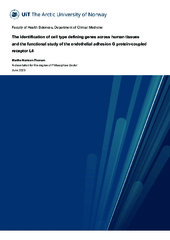| dc.contributor.advisor | Butler, Lynn | |
| dc.contributor.author | Norreen-Thorsen, Marthe | |
| dc.date.accessioned | 2023-06-14T10:09:53Z | |
| dc.date.available | 2023-06-14T10:09:53Z | |
| dc.date.issued | 2023-06-30 | |
| dc.description.abstract | Cell type specific gene expression profiles underlie differences in cell morphology, behaviour, and specialized function. Single cell RNA sequencing can be used to measure gene expression in individual cells, but challenges remain including limited read-depth, artefactual changes due to dissociation from tissue, difficulties in the analysis of fragile or morphologically complex cell types, and bias introduced from the analysis of a limited number of biological replicates. In paper I, we used an integrative correlation analysis to define cell type enriched transcripts from bulk RNAseq, generated from visceral and subcutaneous adipose tissue. We identified depot and sex-specific differences. In Paper II, we expanded our analysis to include cell types in 15 human tissue types, to create a cell type enrichment prediction atlas for all protein coding genes. A cross-tissue comparison identified shared enrichment signatures between cell types in different tissues. We also defined core identity profiles of cell types present in all or most tissue types, including endothelial cells (EC), which can vary in gene enrichment profiles across different vascular beds. The focus of paper III was the functional characterisation of one such highly EC enriched gene, adhesion G protein-coupled rector L4 (ADGRL4). EC have a major role in various biological processes, including the regulation of inflammatory responses and haemostasis. The endothelial restricted expression of ADGRL4 is indicative of an important cell type specific role in EC. We depleted ADGRL4 in EC and measured associated changes in proteome and function, under normal and cytokine stimulated conditions. Under inflammatory conditions, ADGRL4 depletion potentiated EC pro-coagulant protein expression and associated thrombin and fibrin formation. Concurrently, ADGRL4 depletion inhibited the expression of inflammation-induced interferon response genes. This indicates that ADGRL4 has a currently unappreciated role in the EC function, with a potential role in the regulation of coagulation during inflammation. | en_US |
| dc.description.doctoraltype | ph.d. | en_US |
| dc.description.popularabstract | Our body is made up of different cell types with unique genes that instruct them on making proteins - the expression profile of which determine cell type characteristics and functions. Analysing gene expression in individual cells can be challenging, especially for delicate or hard-to-separate cell types. In this study, we examined human tissue data without separating the cells. By comparing gene expression patterns, we firstly identified genes specific to different cell types in fat. We then expanded this analysis to 15 tissues, and we found similarities between related cell types across tissues, including endothelial cells (EC) lining blood vessels. Focusing on one gene expressed specifically in EC, ADGRL4, we uncovered its potential roll in the regulation of cell structure, inflammation-related proteins, blood clotting, and immune responses. | en_US |
| dc.identifier.uri | https://hdl.handle.net/10037/29399 | |
| dc.language.iso | eng | en_US |
| dc.publisher | UiT The Arctic University of Norway | en_US |
| dc.publisher | UiT Norges arktiske universitet | en_US |
| dc.relation.haspart | <p>Paper I: Norreen-Thorsen, M., Struck, E.C., Öling, S., Zwahlen, M., Von Feilitzen, K., Odeberg, J., … Butler, L.M. (2022). A human adipose tissue cell-type transcriptome atlas. <i>Cell Reports, 40</i>(2), 111046. Also available in Munin at <a href= https://hdl.handle.net/10037/27364> https://hdl.handle.net/10037/27364</a>.
<p>Paper II: Dusart, P., Öling, S., Struck, E., Norreen-Thorsen, M., Zwahlen, M., Von Feilitzen, K., ... Butler, L.M. A tissue centric atlas of cell type transcriptome enrichment signatures. (Manuscript). Also available in bioRxiv at <a href=https://doi.org/10.1101/2023.01.10.520698>https://doi.org/10.1101/2023.01.10.520698</a>.
<p>Paper III: Norreen-Thorsen, M., Gottlob L, Kral-Pointner JB, Öling S, Struck EC, Odeberg J, Naudin C, Dusart PJ, Butler LM. Adhesion G protein-coupled receptor L4 modifies the endothelial cell response to tumour necrosis factor. (Manuscript). | en_US |
| dc.rights.accessRights | openAccess | en_US |
| dc.rights.holder | Copyright 2023 The Author(s) | |
| dc.rights.uri | https://creativecommons.org/licenses/by-nc-sa/4.0 | en_US |
| dc.rights | Attribution-NonCommercial-ShareAlike 4.0 International (CC BY-NC-SA 4.0) | en_US |
| dc.subject | VDP::Matematikk og Naturvitenskap: 400::Basale biofag: 470::Cellebiologi: 471 | en_US |
| dc.subject | VDP::Mathematics and natural science: 400::Basic biosciences: 470::Cell biology: 471 | en_US |
| dc.subject | VDP::Matematikk og Naturvitenskap: 400::Basale biofag: 470::Molekylærbiologi: 473 | en_US |
| dc.subject | VDP::Mathematics and natural science: 400::Basic biosciences: 470::Molecular biology: 473 | en_US |
| dc.title | The identification of cell type defining genes across human tissues and the functional study of the endothelial adhesion G protein-coupled receptor L4 | en_US |
| dc.type | Doctoral thesis | en_US |
| dc.type | Doktorgradsavhandling | en_US |


 English
English norsk
norsk
